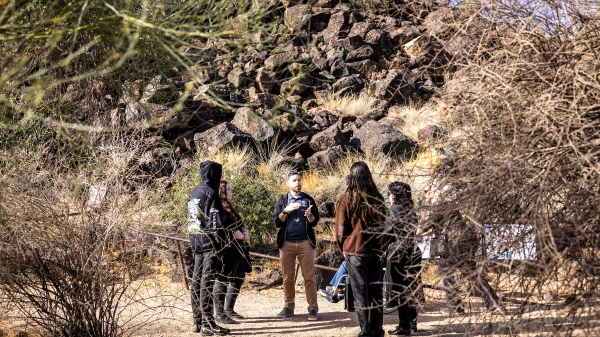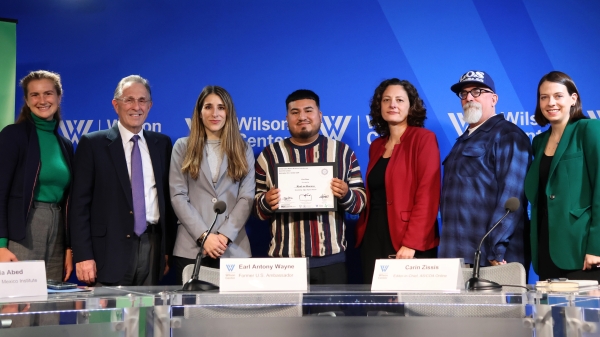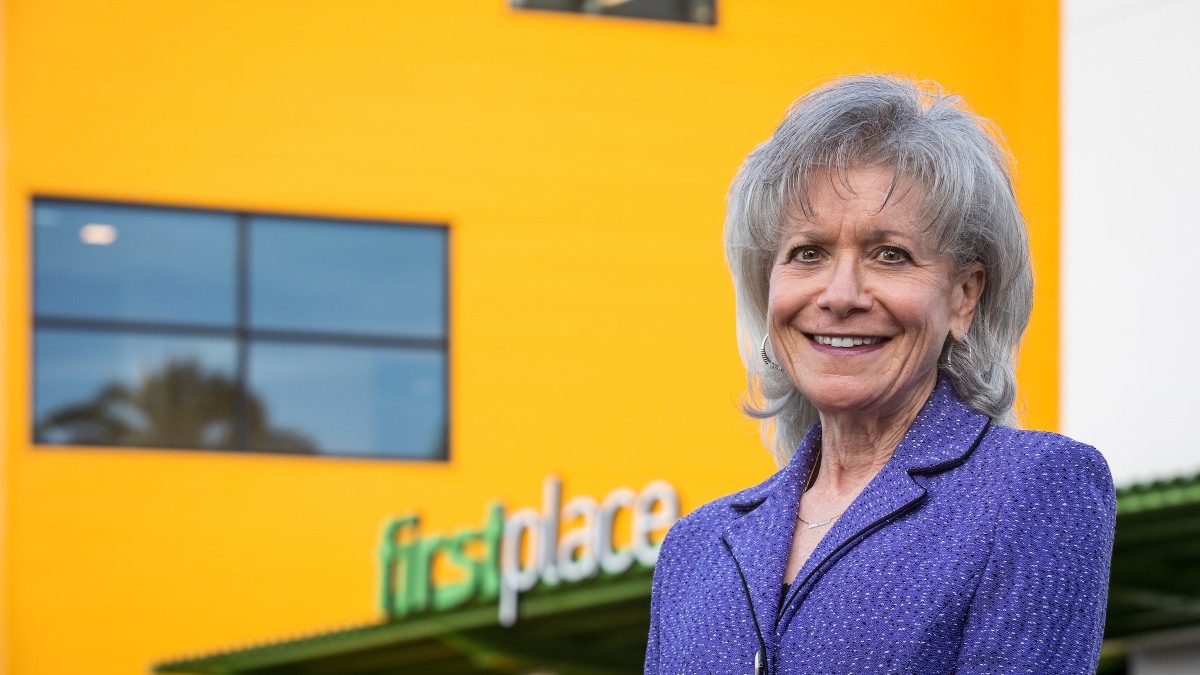An Arizona State University alumna has been on a decades-long mission to provide housing for people with autism, and her collaboration with ASU on a new research report will make it easier to address the crisis.
Denise Resnik, founder and CEO of the First Place AZ nonprofit, teamed up with the Morrison Institute for Public Policy at ASU on the recently released study, “A Place in the World: Fueling Housing and Community Options for Adults with Autism and Other Neurodiversities.”
The report seeks to establish a common language for all the stakeholders involved in creating housing for people with autism – families, investors, real estate developers, nonprofit and philanthropic groups, government agencies and decision-makers. A universal terminology will make it easier to collect data and create policies.
Resnik has worked on this issue since her son was diagnosed with autism in 1993, and she saw her work come to fruition with the 2018 opening of First Place, a residential community in Phoenix for adults with autism.
Nationwide and in Arizona, there is a severe shortage of housing for adults with autism and intellectual and developmental disabilities, and “A Place in the World” lays out the obstacles.
“This incredible body of work came about following what has been a challenging journey of trying to help express what our son needs and what other people need in terms that a marketplace can understand,” said Resnik, who was an editor and publisher of the study.
The need is great. The report points out:
- More than 7 million people in the U.S. have an intellectual or developmental disability, including more than 157,000 in Arizona.
- About 75% of adults with an intellectual or developmental disability live with family members and most do not receive formal services or supports.
- Approximately 50,000 young people with autism exit high school each year.
- One study found that 49% of adults with autism lived in the home of a parent or relative.
- In 2017, 1.3 million people with an intellectual or developmental disability lived with a caregiver who was over age 60.
Resnik has a deep background in housing development. She graduated from ASU in 1982 with a degree in business administration, and her first job was with the Del Webb Corp., which pioneered the concept of retirement communities. In 1986, she started her own marketing company, DRA Collective, focused on real estate and community development.
When her son, Matt, was diagnosed with autism at age 2, the family was told “to love, accept and plan to institutionalize him.” So they visited institutions.
“I remember what I saw and how they smelled and I ran away as fast as I could. I became committed to finding a better way.”
In 1997, she co-founded the Southwest Autism Research and Resource Center, a nonprofit dedicated to supporting people with autism throughout their lifetimes.
“I knew that would lead us to residential housing, and I tried to get there right away,” she said. But the journey ended up taking many years. The real estate industry and government policy are complex. In 2012, she launched First Place AZ, a nonprofit to work on housing, which is separate from SAARC, which focuses on advocacy and research.
Resnik compares the evolution of housing for retired people, which has expanded from a focus on golf to including a wide range of options, to the need for housing for people with neurodiversities.
“We need to realize there is not a ‘one-size-fits-all.’ We need a mature marketplace,” she said, with choices in types of housing and levels of support.
For that to happen, all sectors must work together – public, private, philanthropic and nonprofit – and that requires a common language, she said.
“A Place in the World” catalogs a huge array of variables in housing to create a shared terminology, including support needs (drop-in, one-on-one), target markets (intergenerational, low-income, seniors, students), housing types (apartments, adaptable homes, dormitories), lifestyle (active living, agricultural, faith-based), payment models (subsidized home ownership, rentals) and project financing (Affordable Multifamily Housing Bonds, charitable campaign, grants, loans, tax credits) among others.
The report also points out obstacles to a healthy housing market. For example, there is no federal landmark housing policy for this population. In addition, Medicaid funding restrictions make it difficult for people who need support to afford housing, according to two policy briefs in the report written by Pooja Paode, who earned bachelor’s and master’s degrees at ASU. She was a Daniel Jordan Fiddle Foundation Adult Autism Public Policy Fellow and graduate research assistant at the Morrison Institute when she participated in the report.
Public policy is driven by data that shows the depth of a problem, but that data is nearly impossible to come by because of the lack of a universal nomenclature, Resnick said. Existing data sets can’t be linked because no one knows exactly what is being measured.
“We need to be able to go to policymakers with actual data and experiences,” she said.
Resnik said that housing for elderly people often follows a progression in intensity from independent living to semi-skilled to nursing. For young adults with autism, the progression might be reversed.
“We need more intensive support early in their adult lives after leaving high school,” she said.
“In the past few decades we’ve made tremendous advances in early identification, early intervention and early education.
“But after they leave high school at the age of 22, they’re faced with a scarcity or disjointed services, and they slide backward. So few resources have been focused on the adults.”
The report includes examples of innovative supportive housing communities, including First Place, in central Phoenix. Residents there have the opportunity to participate in the First Place Transition Academy, a two-year program run by the Southwest Autism Research and Resource Center that builds independent living and career skills. The residents also have community activities and other supports, including vocational skills building and a culinary teaching kitchen.
First Place also is home to the First Place Leadership Institute, a hands-on training center for professionals, educators, support staff and medical personnel. The center offers a fellowship in which doctoral students in the Watts School of Public Policy and Community Solutions at ASU can conduct research while living and participating in the community.
The “Call to Action” portion of the report was written by Resnik and Desiree Kameka Galloway, director of the Autism Housing Network. Among the actions they urge are:
- Require local and state housing plans to include people with autism and intellectual and developmental disabilities.
- Make it easier for underutilized properties to be developed into supportive housing, including incentives, planning grants and capacity-building initiatives for faith-based congregations, universities, community colleges, vacant land or remnant lots, etc.
- Expand programs such as Non-Elderly Disabled Housing Choice Vouchers, Medicaid HBCS waivers and Low-Income Housing Tax Credits.
- Revise the IRS tax code to incentivize donations to nonprofits that provide housing.
- Help families and friends understand how to bequeath or purchase a home for a loved one with autism that protects them from financial exploitation, provides an adequate plan for sustainability and increases the housing stock available for others in need.
After Resnik’s son, Matt, moved into First Place, a blog on the website followed his victories and challenges as he learned how to do his laundry, keep track of his apartment key and host dinner parties for friends.
“A Place in the World” takes a respectful approach on what autism is and isn’t, Resnick said.
“It reinforces my personal belief that a diagnosis need not stand in in the way of an individual’s opportunity to have a friend, a job, a home and a community that is important to them.”
Top image: Denise Resnik, founder and CEO of the First Place AZ nonprofit organization, stands in front of First Place, the residential community for adults with autism that opened in 2018. The residents, including Resnik's son, get supports including life and career skills building. Photo by Charlie Leight/ASU Now
More Arts, humanities and education

Petroglyph preserve celebrates 30th anniversary with ancient, modern tales
The Deer Valley Petroglyph Preserve provides a beautiful walk through a pristine desert where chuckwalla lizards are as plentiful as the cacti that comes in many shapes and sizes.It’s also a step…

Kaleidoscope short film contest inspires powerful binational filmmaking in its second year
“We come to this country not to steal anybody’s jobs but to take advantage of the opportunities that the rest ignore. We’ve been taking care of the American soil for many years. But our hands will…

ASU's Neal Lester reflects on life, death of poet Nikki Giovanni
When Neal Lester heard on Monday that poet and activist Nikki Giovanni had died, the news hit hard.Lester, the founding director of Arizona State University’s Project Humanities and a Foundation…
